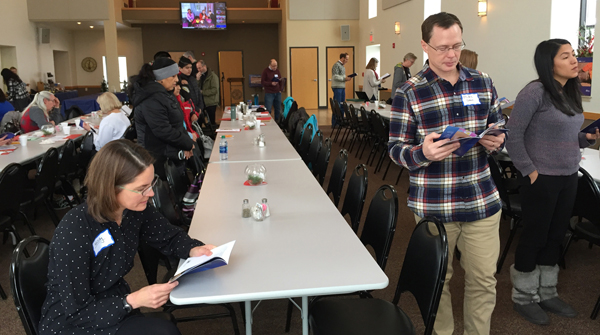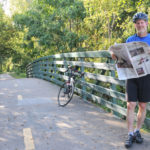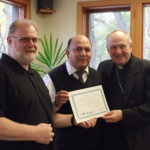
Participants at Social Action Saturday began the day (Jan. 26) with a 14-station solidarity prayer walk that featured posters depicting immigrants and refugees. The half-day conference at St. Mary Parish in Riverside focused on the lived experiences of immigrants and refugees.
By Barb Arland-Fye
The Catholic Messenger
RIVERSIDE — Snow fell softly outside St. Mary Parish Hall while inside some 50 people walked quietly around the room, stopping to pray before each of 14 posters depicting immigrants and refugees.
Kent Ferris, director of the diocesan Social Action Office, chose this prayer exercise to convey for Social Action Saturday (Jan. 26) participants a sense of journeying in solidarity with immigrants and refugees. The half-day conference focused on the lived experiences of immigrants and refugees in the Diocese of Davenport to bring that reality closer to home. The day also included a 50th anniversary celebration for the Social Action Office, with Mexican tres leches cake served to participants.
The 14-station solidarity prayer walk and accompanying prayer guide are part of a two-year global campaign that Pope Francis launched in September 2017 in support of migrants and refugees. The prayer walk, created by Catholic Relief Services, is available to parishes through the Social Action Office.
Ferris said the day would begin in prayer, followed by learning, which in turn leads to action. Professor Kristy Nabhan-Warren, the Figge Chair of Catholic Studies at the University of Iowa, provided the first learning opportunity. She shared stories from 5-1/2 years of research for her book, now in draft form, and tentatively titled “Cornbelt America: Work, Food, and Faith in the Heartland.”
Getting to know immigrants
“I started out by attending Mass at St. Joseph the Worker in Columbus Junction and St. Joseph in West Liberty, to try to understand how rural Iowa parishes are addressing migration and changing parish dynamics,” Nabhan-Warren said. She talked with parishioners and got to know Father Greg Steckel, who was pastor of the West Liberty parish; Father Joseph Sia, who was pastor of the Columbus Junction parish; and Father Rudy Juarez, who is pastor of St. Patrick Parish in Iowa City. She attended meetings in West Liberty to “gain a better grasp of how residents of the first Latino/a majority town in Iowa were addressing issues of education, migration and the challenges and opportunities facing their community.”
Fr. Sia, now the diocese’s vocation director, and Father Bernie Weir, pastor of St. James Parish in Washington, convinced her to reach out beyond the parishes to the workplaces of immigrants. She gave a shout-out to the two priests, both in attendance, for being instrumental in her walk with immigrants.
On his first day at the Columbus Junction parish, Fr. Sia said he took a tour of the town at the invitation of a parishioner, the late Frank Gregan. “He intentionally drove me to the Tyson plant and to the trailer park nearby and told me, ‘Father, these are where your parishioners work and live. I want you to see this.’ It was a very powerful experience for me. Frank died a couple of weeks after that, and I am grateful for what he did that day.
“Indeed, after being in the parish for some time, I realized that what I was seeing in the church building was but the tip of the iceberg. It was not enough to encounter my parishioners at Mass, but to know them more fully so that I could be a good spiritual father to them; I had to be where they lived their lives and practiced their faith. That’s why I suggested to Kristy to go beyond the confines of the church itself.”
Nabhan-Warren’s walk with immigrants included tours of two meat-packing plants where many immigrants work, Tyson Pork in Columbus Junction and Iowa Premium Beef (IBP) in Tama. Fr. Sia toured the Tyson plant with her.
She set the scene, vividly describing a day on the job for a Congolese worker named Alain. “… The raw meat that enters and exits the packing plants that dot the Midwestern Cornbelt is killed, processed, and packaged by the hardworking bodies of mostly Latino/a, African, and Chin-Burmese immigrants and refugees like Alain,” she said.
The new ‘Ellis Island’
She described the Midwestern cornbelt as “the new Ellis Island for brown and black immigrants…. Word of work travels quickly among migrants and refugees: where there is meat, there is work. … Midwestern farmers and ag companies have been recruiting workers for years now, sending emissaries to Central America to spread the word of available work, as well as renting motels and providing food allowances for refugees during their first weeks in the United States.”
In the bigger picture of the migration crisis, she asked her audience, “Where do you fit in, as Roman Catholics here in the Heartland, the Hawkeye state?” She called for “an ethic of accompaniment” and to “draw upon our privileges and resources to help make the lives of others better. From providing rides to the grocery store to gift cards for necessities, to helping fill out paperwork – these are things we can do. And I know that many of you here do these acts of mercy and accompaniment each day.”
Catholics and non-Catholics like herself, she said, need to be church in the fullest sense of the word, to show preferential option for the poor, the oppressed, the hungry and the needy, and to help families stay together.
She hopes that her book, to be published in about a year, will “give my readers a better idea not only of how Catholicism has been lived by Irish and German and now Mexican-descent Catholics in Iowa, but to encourage empathy and understanding of the difficulties facing contemporary migrants and asylum-seekers.”
“Hopefully, those who will read the book may come to a fuller appreciation of the many positive contributions that immigrants bring to society and our church,” Fr. Sia said. “Also, for the immigrants themselves, I hope their self-image may be strengthened when they realize that a white woman university professor has taken the time and effort to listen to them and to tell the world about some of their most intimate stories.”
Immigrants share their stories
“Immigration law is changing under our feet,” Ferris said before introducing the first of two immigrants who fled their homelands. These changes impact the Davenport Diocese’s Immigration Office that focuses on family reunification immigration cases.
Diego, an immigrant from Guatemala seeking asylum, walked slowly to the podium to share his story, which included being separated from his teenage son at the border. Diego wore new work boots, jeans and a NASCAR jacket – which a family gave to him after he was released from detention. He was later reunited with his son. The Diocese’s Social Action Office, which oversees the Immigration Office, accepted a request of the U.S. Conference of Catholic Bishops to provide 90 days of family reunification services to Diego and his son.
Immigration Counselor Karina Garnica served as Diego’s interpreter. He repeatedly thanked all who came to the aid of himself and his son. He said they fled Guatemala because of death threats made against his son. “I didn’t feel protected,” Diego said, because police responded only after a person was found dead. He was sad to have to leave behind his wife and two younger children. Detained at the border, he and his son were separated for 40 days. Detainees suffered a lot, Diego said. The success of a class action lawsuit on behalf of families like Diego’s who experienced injustice at the border means that his case for asylum will be heard.
Gloria’s story
A member of St. Mary Parish in Davenport, Gloria Mancilla shared the story of her family’s flight from Mexico when she was 9 years old. Her father was a doctor whose life was in jeopardy. In the U.S., she excelled in school and was encouraged to apply to college. Asked to produce her Social Security number, she discovered that she didn’t have one. “It’s as if I didn’t belong here,” she said. While she earned an associate’s degree in nursing at community college, she could not take state exams to practice nursing without a Social Security number. “I felt like I didn’t do anything wrong. I’m just trying to make this country better,” she said, her eyes tearing up.
Recently, she was granted a U visa (as a victim of a crime), which means she is a lawful, permanent resident. To pursue her dream of becoming a nurse she would have to retake her classes because of the years that have passed since earning her associate’s degree.
While she is disappointed by that setback, “it is wonderful to get out of the shadows.” She also vowed to work to end the injustice toward immigrants like herself, who arrived in this country as children and have grown up to be productive adults. “We are Americans,” she said.
Sabbatical to Jordan
Father David Brownfield, a diocesan priest, gave a presentation on his sabbatical to Jordan. It is the land of the patriarchs, he said, but it is also the land of refugees and migrants. In fact, a full one-third of the population is comprised of immigrants, he said. While just 3 percent of the population is Catholic, Catholic Relief Services (CRS) has local partnerships in Jordan to help provide a hand-up to refugees and immigrants and others in need, Fr. Brownfield said. “Thank you for helping the Catholic Church to reach out to others” through donations to CRS and participation in the annual Lenten Rice Bowl program, a CRS fund-raising project, he added. “Rice Bowl brings hope and joy to many immigrants and refugees.”











